Events



The EUthyroid2 kick-off meeting was held on 27-29th March 2023 in Krakow, Poland. All consortium members presented their organisations and roles in the project. This two-day meeting offered an overview of the work packages and an outline of detailed plans.
The representatives of the project partner institutions met with other consortium members to align on the next steps for increasing awareness of iodine deficiency disorders (IDD) and related risks among adolescents and young women in Europe and beyond.
The project builds on EUthyroid and the Krakow Declaration on iodine and will establish best practice models for cost-effective, sustainable prevention of IDD across EU member states.
Professor Henry Völzke (University Medicine Greifswald), the scientific coordinator of the EUthyroid2 project, identified the project aims. All work package leaders outline their road map for the activities of the first year of the project to the consortium.
The project participants and partners are committed to taking important steps toward the elimination of iodine deficiency and preventable iodine-related disorders in Europe and beyond.
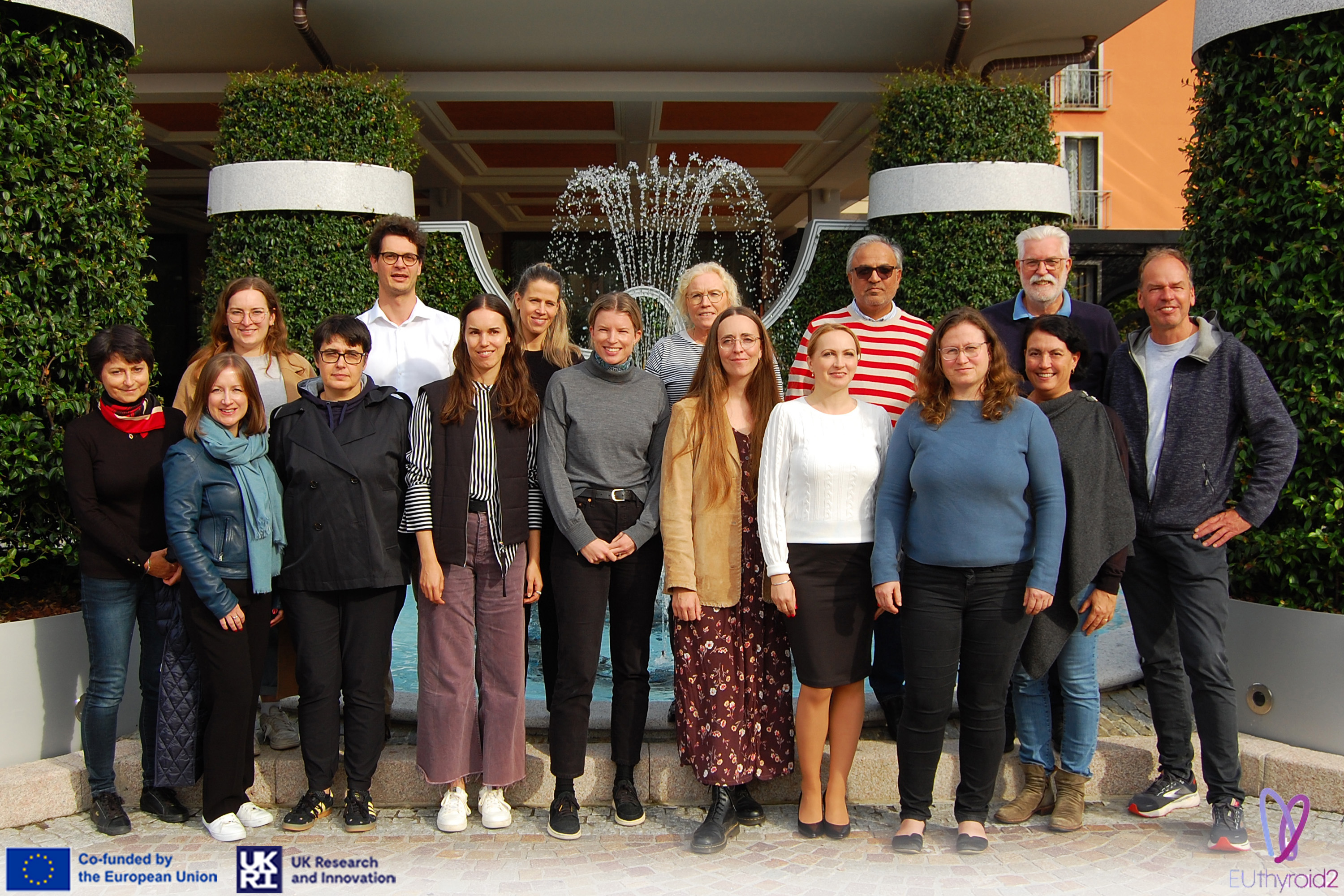
The Second Annual Meeting of the EUthyroid2 project was held on the 9th of October, 2024, in Baveno, Italy. The meeting offered an excellent opportunity for the work packages to present the progress achieved and give an outline of tasks ahead.
The Advisory Board Members participated in the meeting online: Prof. Dr. Heather Foran, the Coordinator of EUthyroid2 sister project, FLOURISH Study, Prof. Christa Meisinger, MD, MPH, Epidemiologist, University of Augsburg, and Prof. Dr. Leonidas Duntas, Endocrinologist, Evgenidion Hospital, University of Athens, offered valuable insights and advice to the consortium.
The day began with an inspiring session by Prof. Henry Völzke, Coordinator of the EUthyroid2 project, who gave an overview of the broader aims for the upcoming year. The meeting progressed with presentations on the study implementation in the ambulatory care and educational settings by Vivien Henck, University Medicine Greifswald, Theresa Heering, Heinrich Heine University Düsseldorf, Signe Skovgaard Hansen, Technical University of Denmark, and Synnøve Næss Sleire, Institute of Marine Research.
Christoph Schickhardt, Ethics Advisor, discussed the question of ethical challenges in the intervention, while Phil Pendt, University Medicine Greifswald summarised the structure of the intervention materials.
Anna Bokor, TFI, gave an overview of the communication and dissemination activities and study materials in different languages.
Through educational and ambulatory care interventions, EUthyroid2 aims to increase awareness among adolescents and young people about the risks of iodine deficiency and the importance of iodine for their health and that of their future offspring.
The project participants and partners are committed to taking important steps toward the elimination of iodine deficiency and preventable iodine-related disorders in Europe and beyond.
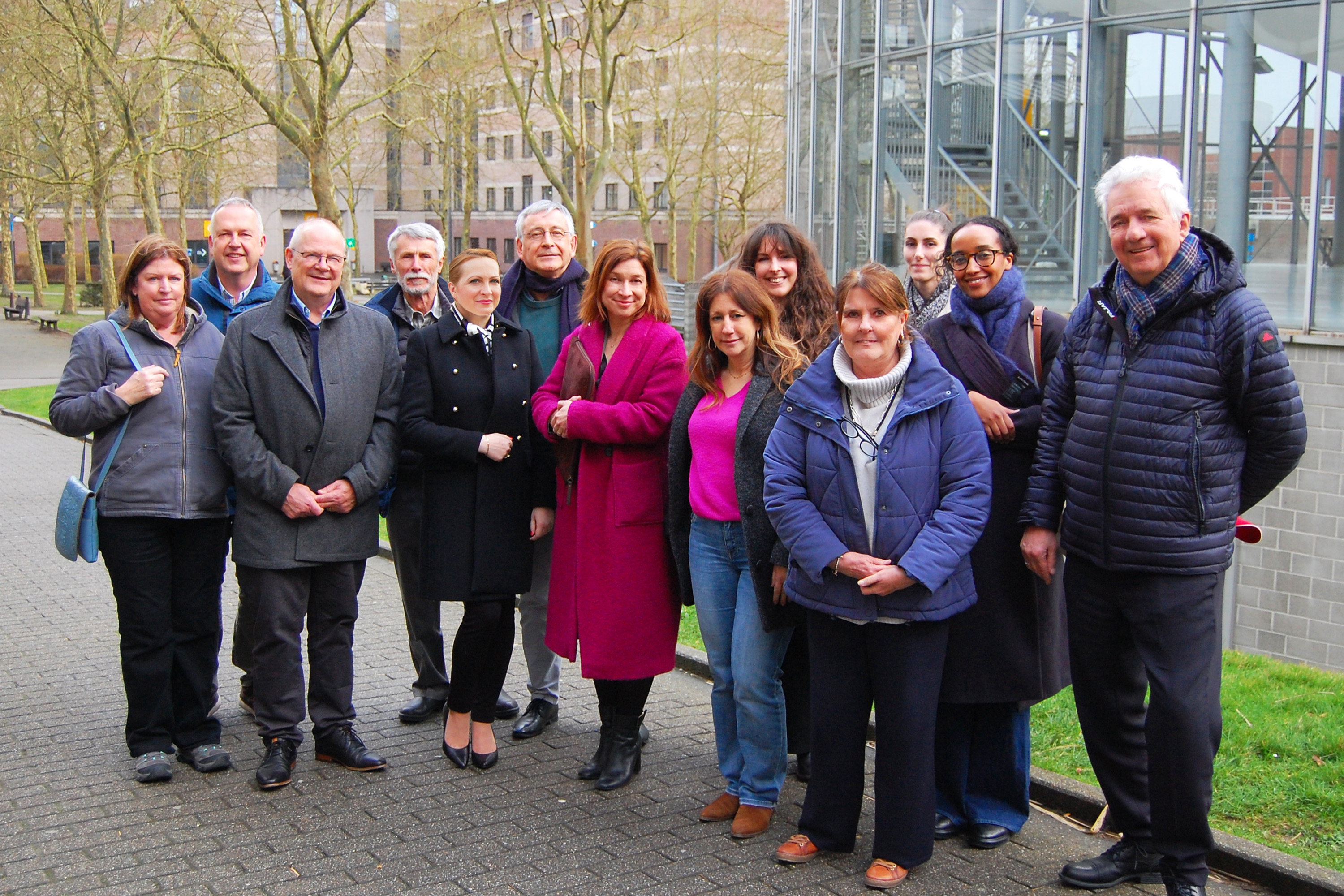
EUthyroid2 took part in the Iodine Coalition Europe Face to Face Stakeholder Meeting, in Brussels, Belgium, on February 27 to discuss the next steps in the fight against iodine deficiency in Europe. The EUthyroid2 Consortium is a member of the Iodine Coalition Europe, along with iodine nutrition experts, representatives of the salt, food, and iodine industries, experts in research and endocrinology, and organisations with a global reach (EUsalt, Thyroid Federation International, World Iodine Association, Iodine Global Network, Unilever, and Culinaria Europe).
Anna Bokor, Communications Director, TFI, partner of EUthyroid2, gave an overview of the Communications Plan for the Coalition. She highlighted that there is low awareness of iodine-related health risks in children and adolescents among policymakers and the public. The first Horizon Europe-funded EUthyroid project suggested that up to 50% of newborns in the region are at risk of iodine deficiency and do not reach their full cognitive potential due to insufficient iodine intake. This represents a major but preventable public health issue. Despite the risks of iodine deficiency, most European countries lack dedicated policies to prevent iodine deficiency disorders, and no harmonised framework exists across the European Union (EU).
Food fortification is an effective strategy for combating iodine deficiency. To ensure that all European citizens have adequate iodine intake, there is a need to harmonise national policies to facilitate access to iodised salt and processed food fortified with iodine.
The partners of the Coalition are committed to working together and taking important steps to ensure that all Europeans have access to iodine.
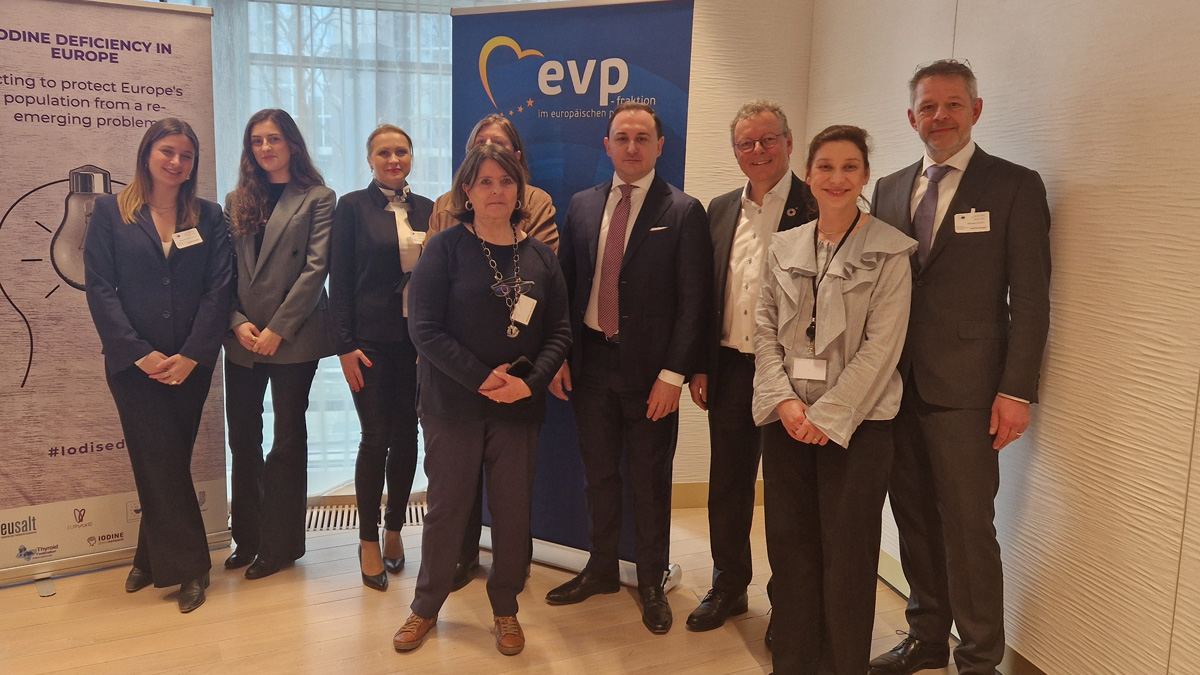
Policymakers, nutrition experts, food and salt industry representatives, and patient organisations met at the European Parliament for a high-level breakfast event in Brussels on March 25 to discuss the problem of iodine deficiency in Europe.
Hosted by MEP Stefan Köhler and organised by the Iodine Coalition Europe, the session highlighted the need for harmonised policies to ensure that all Europeans have access to iodine.
Several partners of the EUthyroid2 project took part in the session: Dr. Sarah Bath, Lecturer in Public Health Nutrition, University of Surrey, Linda Henderson and Anna Bokor, Thyroid Federation International, Joyce Greene, Iodine Global Network, and Attilio Caligiani, World Iodine Association.
Throughout the discussion, the speakers Joyce Greene, Dr. Sarah Bath, Michael Durst (Unilever), and Dr. Urs Hofmeier (EUsalt) reinforced the importance of promoting the sustainable prevention of iodine deficiency in Europe.
A Joint Statement on tackling iodine deficiency was presented at the event, in which the partners of the Iodine Coalition Europe call on EU policymakers to support regulatory alignment, simplify labelling, and ensure that iodised salt is widely available to protect public health.
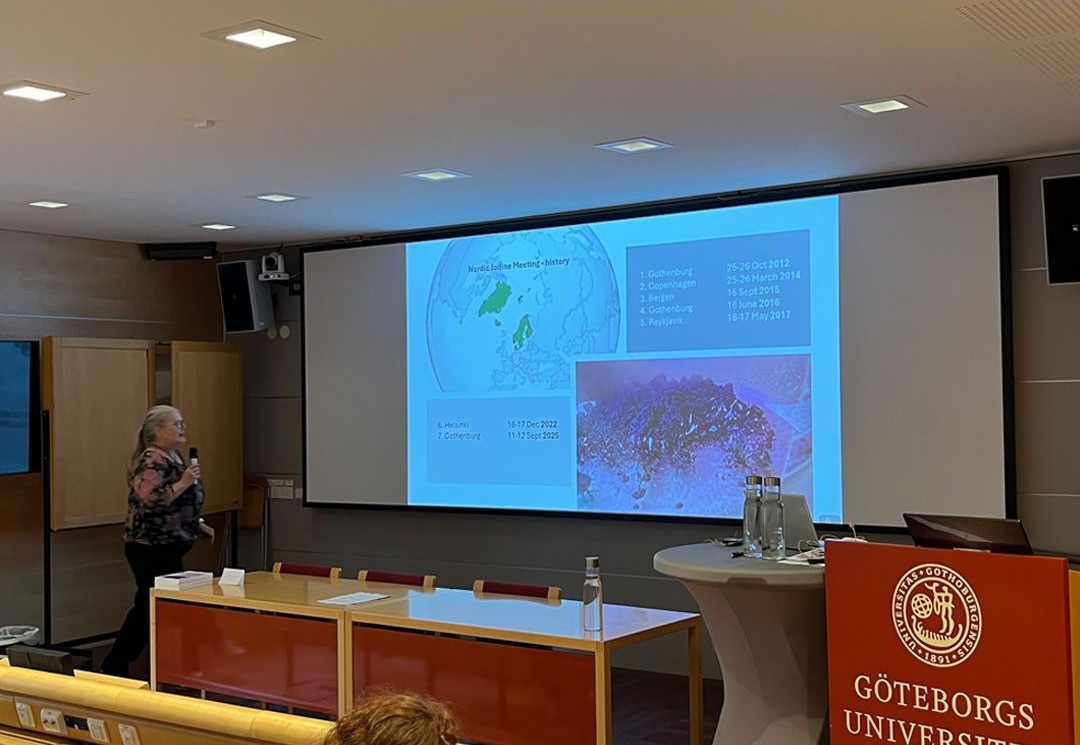
Prof. Helena Filipsson Nyström, Region Västra Götaland, Sahlgrenska University Hospital, and her research team, hosted the Nordic Iodine Conference in Gothenburg, Sweden, on September 11-12, 2025. The congress brought together renowned experts from various fields, including nutritionists, endocrinologists, and researchers from a broad range of educational institutions and countries. Along with the presentation of the EUthyroid2 research project, several insights, data, and research on iodine and iodine status were presented. During two intense days of networking, sharing experiences, participants worked to brainstorm effective strategies for the prevention of iodine deficiency in the region.
Monitoring of iodine programs is important:
In Sweden, for example, the food industry does not always use salt with iodine; therefore, the iodine level in processed food may vary. New trends in food consumption are emerging: the use of non-iodised salt and flaky sea salt has become popular in Europe, including Sweden.
Mild iodine deficiency, on the societal level, is important. Insufficient iodine intake can lead to a reduction in a child's IQ, hindering children's learning ability, school performance, and later resulting in less productivity in adulthood. Maintaining adequate iodine levels contributes to a sustainable society.
This conference is a wonderful example of collaboration and cooperation among partners to take steps towards the control and prevention of iodine deficiency in Europe. A big thank you for the impactful conference to our EUthyroid2 partner, Prof. Helena Filipsson Nyström!
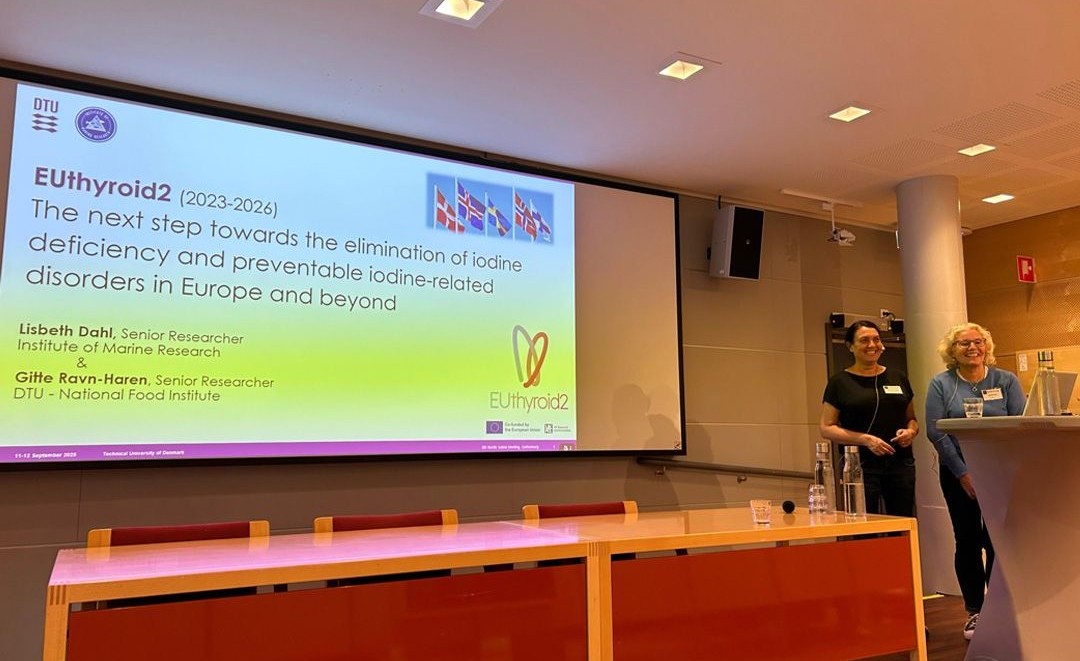
Two partners of EUthyroid2, Lisbeth Dahl, Nutritionist and Senior Scientist at the Institute of Marine Research, Bergen, Norway, and Gitte Ravn-Haren, Senior Researcher in the research group for risk-benefit at the National Food Institute, Technical University of Denmark, presented the EUthyroid2 interventions and initial results at the Nordic Iodine Conference in Gothenburg, Sweden, on September 11-12, 2025.
This year, Sweden hosted the Nordic Iodine Conference, and Helena Filipsson Nyström, Professor at Region Västra Götaland, Sahlgrenska University Hospital, along with her research team, welcomed researchers, nutritionists, and experts in the field to Gothenburg to give an overview of iodine statuses and research projects for each participating country.
At the conference, EUthyroid2 partners gave an overview of the problem of iodine deficiency in Europe, EUthyroid2 project interventions, and the mission of EUthyroid2 to improve awareness of iodine nutrition among children, adolescents, and young women across the study regions. They outlined the future strategies for preventing iodine deficiency and worked to strengthen collaboration among Nordic countries.
A big thank you to Lisbeth Dahl and Gitte Ravn-Haren for presenting the EUthyroid2 research and for their tremendous work to deliver successful interventions within the project!
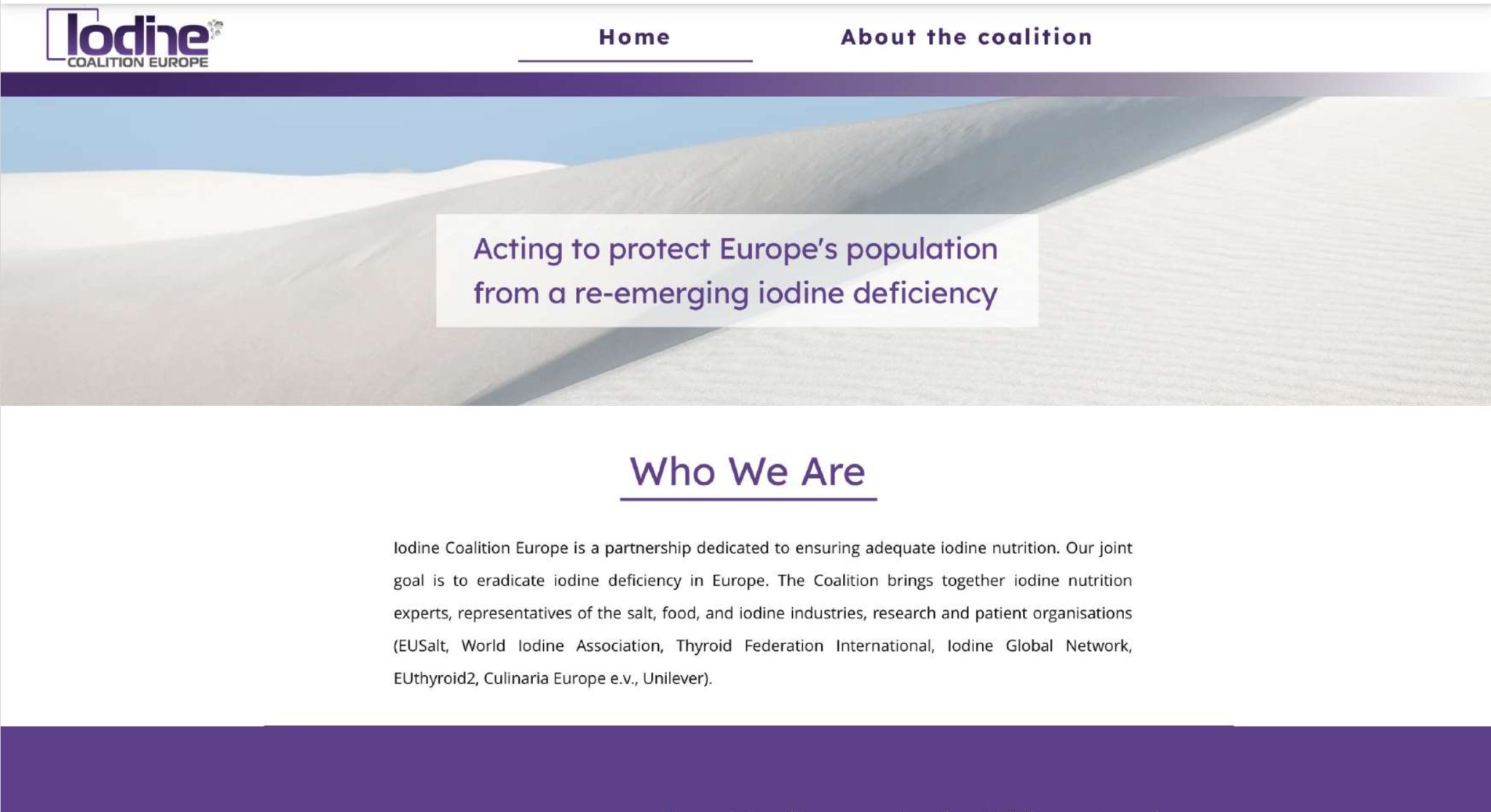
The EUthyroid2 Consortium is a member of the Iodine Coalition Europe, a partnership dedicated to ensuring adequate iodine nutrition. Our joint goal is to tackle iodine deficiency in Europe. The Coalition works to support the work of both the initial EUthyroid and the current EUthyroid2 health research projects to be translated into awareness raising and action.
Partners of the EUthyroid2 project: World Iodine Association, and Thyroid Federation International collaborated to develop the website of the Coalition:
https://www.iodinecoalitioneurope.org/
This dedicated website serves as a central hub for information on the mission and important milestones of the Coalition. It will be updated regularly to showcase key events and activities.
Along with members EUsalt, World Iodine Association, Thyroid Federation International, Iodine Global Network, Culinaria Europe e.V., Unilever, EUthyroid2 works to address, prevent, and control the ongoing and widespread problem of iodine deficiency. We aim to promote salt iodisation, including the use of iodised salt in processed foods, and address the obstacles hindering its full implementation. By working together, we can ensure that all Europeans have access to iodine.
Our focus is on creating awareness among consumers on the importance of iodine, among officials to encourage policy changes, and among FBOs so they are ready to provide products with iodised salt. Similarly, we work to address consumer concerns regarding iodised salt ingredient labelling to provide an incentive for FBO to use iodised salt in more products available on the market. Furthermore, we aim to support the European framework and work to remove barriers to trade in the internal market created by national legislations.
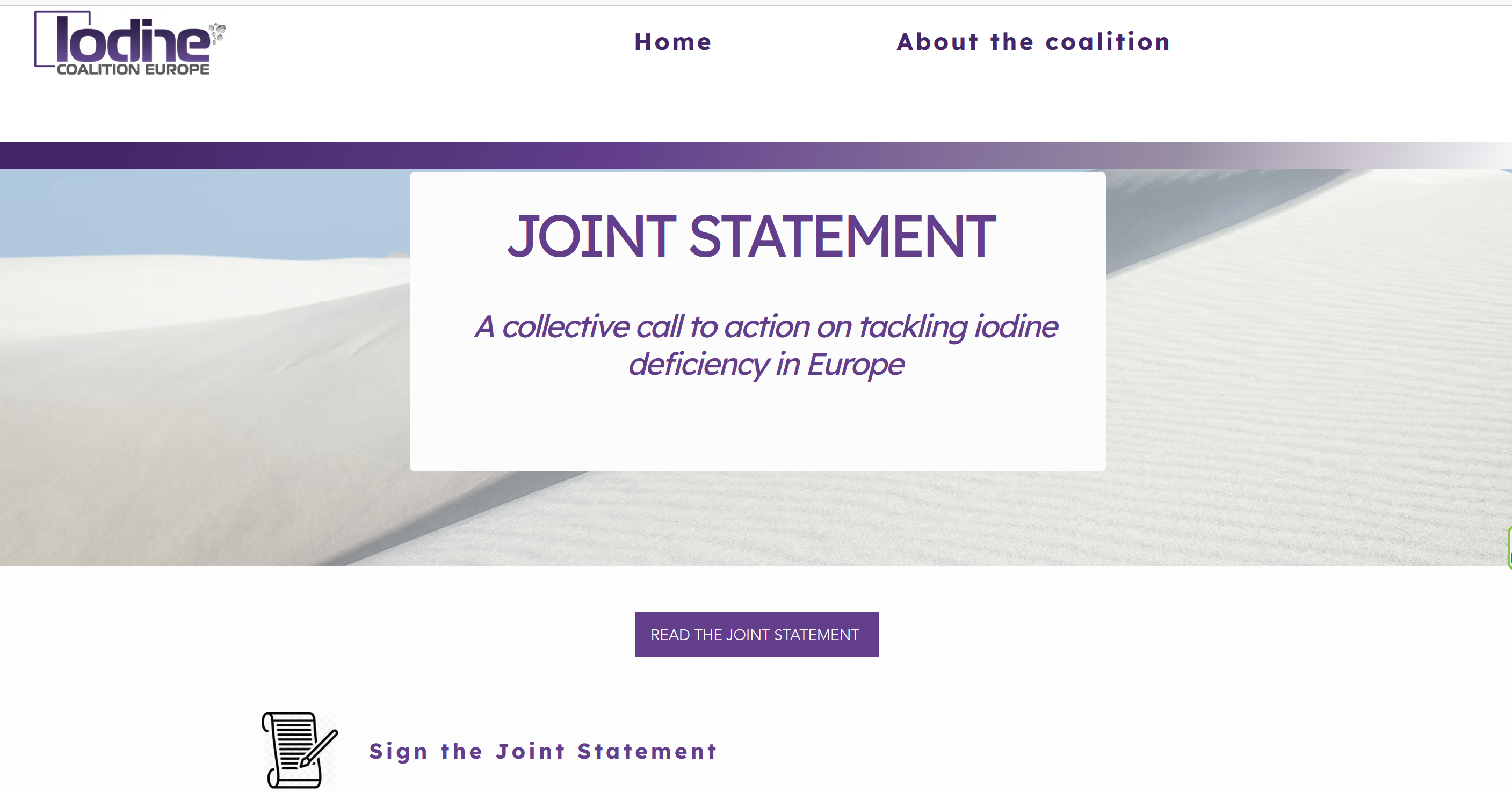
The high-level breakfast session to take steps against iodine deficiency, at the European Parliament, hosted by MEP Stefan Köhler and organised by the Iodine Coalition Europe, in Brussels, on March 25, marked the presentation of the Joint Statement: A collective call to action on tackling iodine deficiency in Europe.
In this Joint Statement, EUthyroid2 and other members of the Iodine Coalition Europe call on EU policymakers to support regulatory alignment, simplify labelling, and ensure that iodised salt is widely available to protect public health.
The first EUthyroid project (2016–2018) revealed alarming findings: up to 50% of newborns in Europe are at risk of iodine deficiency and do not reach their full cognitive potential due to insufficient iodine intake. This represents a major but preventable public health issue. Despite these risks, most European countries lack dedicated policies to prevent iodine deficiency disorders, and no harmonised framework exists across the European Union (EU).
In 2023, EUthyroid2 was launched to build on the first EUthyroid initiative, aiming to improve iodine knowledge and intake, particularly among children, adolescents, and young women. The WHO-IGN 2024 report later confirmed that changes in diet and lifestyle are threatening a re-emergence of the problem in parts of Europe, with pregnant women being especially vulnerable.
To address this, the Iodine Coalition Europe (ICE) was established in 2025 to promote the use of iodised salt in processed foods and advance iodine nutrition initiatives.
A call for coordinated action
Food fortification has proven to be an effective strategy for combating iodine deficiency. However, inconsistent national policies across the EU are undermining these efforts. To ensure that all European citizens have adequate iodine intake, a harmonised approach is needed.
Within the Joint Statement, EUthyroid2, along with members of the Iodine Coalition Europe, call for urgent action from the European Commission and national governments to:
- recognise the essential role of iodine in human nutrition and health
- recognise iodine deficiency as a public health priority in Europe
- review national policies on salt iodisation to remove intra-community trade barriers and provide legal certainty for commercial operators
- simplify labelling to encourage the use of iodised salt in food production
- monitor dietary iodine intake at the national level across Europe
Read the whole JOINT STATEMENT, A collective call to action on tackling iodine deficiency in Europe:
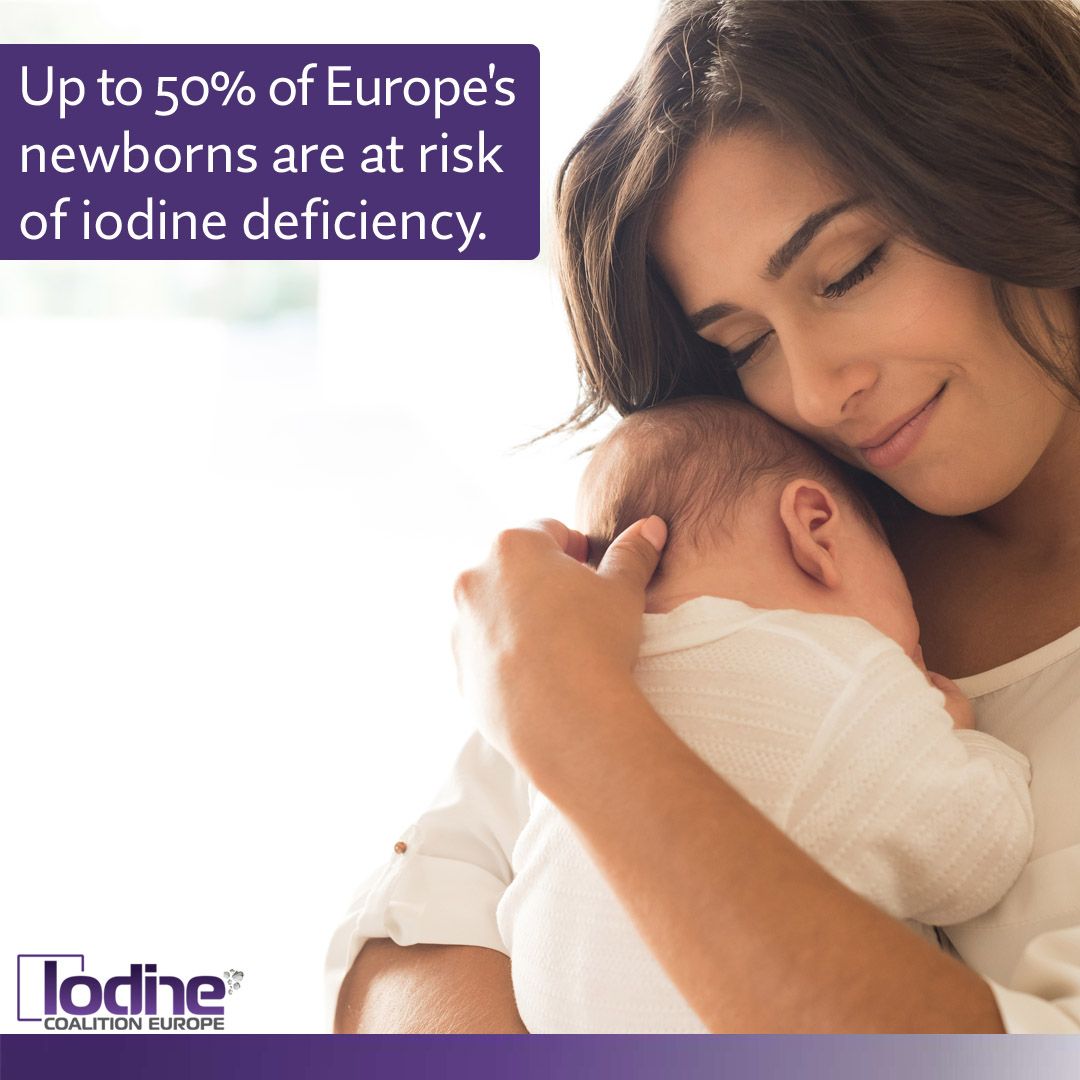
EUthyroid2 is a proud member of the Iodine Coalition Europe along with iodine nutrition experts, representatives of the salt, food, and iodine industries, research and patient organisations (EUsalt, World Iodine Association, Thyroid Federation International, Iodine Global Network, Culinaria Europe e.V., Unilever).
On September 9, 2025, partners of the Coalition: World Iodine Association and Thyroid Federation International launched a LinkedIn account for Iodine Coalition Europe and will publish regular posts on news and activities.
Iodine deficiency is a serious public health concern in Europe as up to half of the region's newborns are at risk of iodine deficiency. Iodine deficiency can lead to various health issues, including impaired cognitive development in children, goitre, and thyroid disorders. While the health of all population groups can be affected, pregnant women and children are especially at risk.
Insufficient iodine intake during pregnancy can lead to lasting brain damage that reduces a child's IQ, hindering children's learning ability and school performance. Even a mild deficiency has implications in terms of health costs. Adding tiny amounts of iodine to salt can address the problem. Consuming iodised salt is the simplest method to ensure sufficient iodine intake.
Follow Iodine Coalition Europe on LinkedIn and find out more about the importance of iodine nutrition, our activities, and our mission to ensure that all Europeans have access to this essential micronutrient!
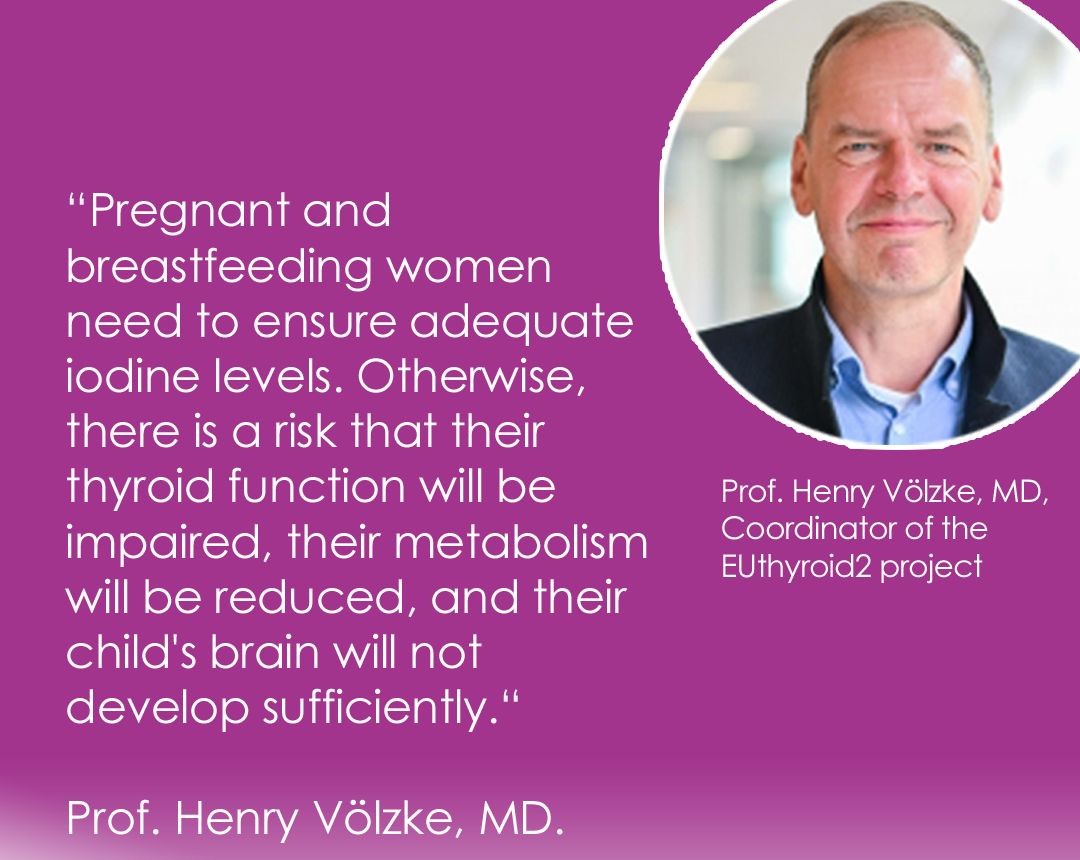
In an interview in the journal "Deutsche Hebammenzeitschrift", September 2025, Prof. Dr. Henry Völzke, EUthyroid2 Project Coordinator, University Medical Center Greifswald, Head of Study of Health in Pomerania (SHIP), and Chairman of the NAKO Research Network. highlighted that pregnant and breastfeeding women need to ensure adequate iodine levels; otherwise, there is a risk that their thyroid function will be impaired, their metabolism will be reduced, and their child's brain will not develop sufficiently.
In Germany, the Federal Ministry of Food and Agriculture has been sensitive to the iodine deficiency issue for years. In 2023, it launched an awareness campaign financed with public funds. The campaign provided information about iodine deficiency during pregnancy. The ministry also advocated for an increase in the amount of iodine added to table salt to 30 ppm (30 µg iodine per gram of salt). Unfortunately, the latter could not be implemented yet, it is not known whether there will be a new legislative initiative.
Despite these efforts, iodine levels continue to decline in Germany mainly due to the widespread consumption of ready-made meals; these are usually produced without iodised table salt.
The first EUthyroid consortium's evaluation of iodine deficiency in Europe uncovered major limitations in awareness of the importance of iodine nutrition. The current project, EUthyroid2, is a four-year health research project that aims to develop best-practice models to inform children, adolescents, and young women, increase their knowledge, and improve their iodine status in order to lay the foundation for their own thyroid and general health, and that of their offspring.
Implementation studies and community-based randomised-controlled intervention trials are underway in educational and ambulatory-care settings in eight study regions.
Partners at EUthyroid2 work tirelessly for our interventions in both settings to be successful; thus, the cost-effectiveness of EUthyroid2 will be significant. The critical point to reach long-term sustainability is to convince policymakers to take their responsibility for iodine fortification and information campaigns.
With our interventions focusing on educating children, adolescents, and young people on the importance of iodine nutrition, we expect that they will rapidly benefit from an improved iodine status.
You can read the whole interview:
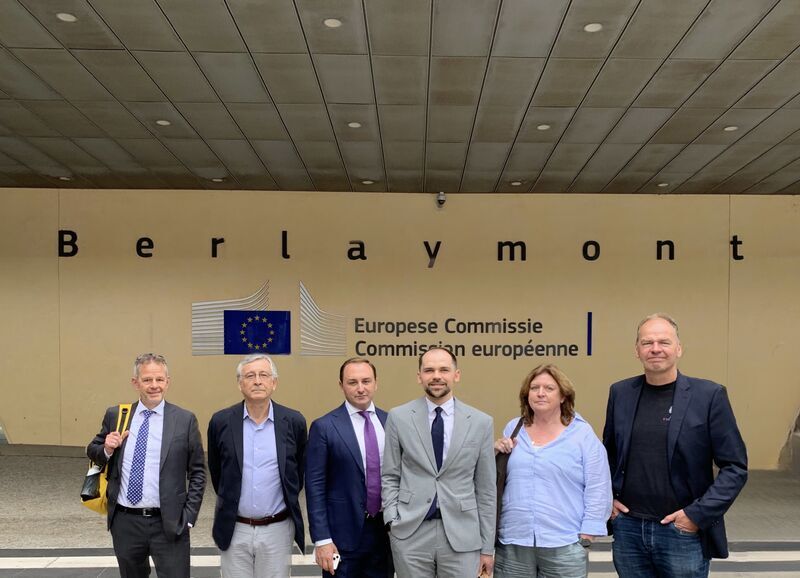
Dr. Henry Völzke, Coordinator of the EUthyroid2 project, partner of the Iodine Coalition Europe, along with other members of the Coalition, met with the Cabinet of Commissioner Olivér Várhelyi, represented by Mr. Flavio Facioni, in Brussels, on 18 September 2025, to discuss the problem of iodine deficiency in Europe, the mission of the Coalition, and the need to take steps and fight against iodine deficiency in the region.
The participating members of the Coalition presented:
It has been highlighted that policymakers need to create an environment that facilitates the dissemination of these tools and encourages the use of iodised salt in processed foods through harmonised policies, clear labelling, and regulatory alignment.
The time to act is now, for the future health of European citizens, and for the future competitiveness of the EU and its Member States.
In the picture, from left to right: Michael Durst, Head of Global Regulatory Affairs, Foods, Unilever Dr. Rodrigo Moreno-Reyes, Regional Coordinator, Western and Central Europe, Iodine Global Network Attilio Caligiani, Director General, World Iodine Association Marian Brestovansky, Director, Policy and Regulatory Affairs, EUsalt Joyce Greene, Senior Advisor, Global Advocacy, Iodine Global Network Dr. Henry Völzke, Universität Greifswald, Germany, Scientific Coordinator of the EUthyroid2 project
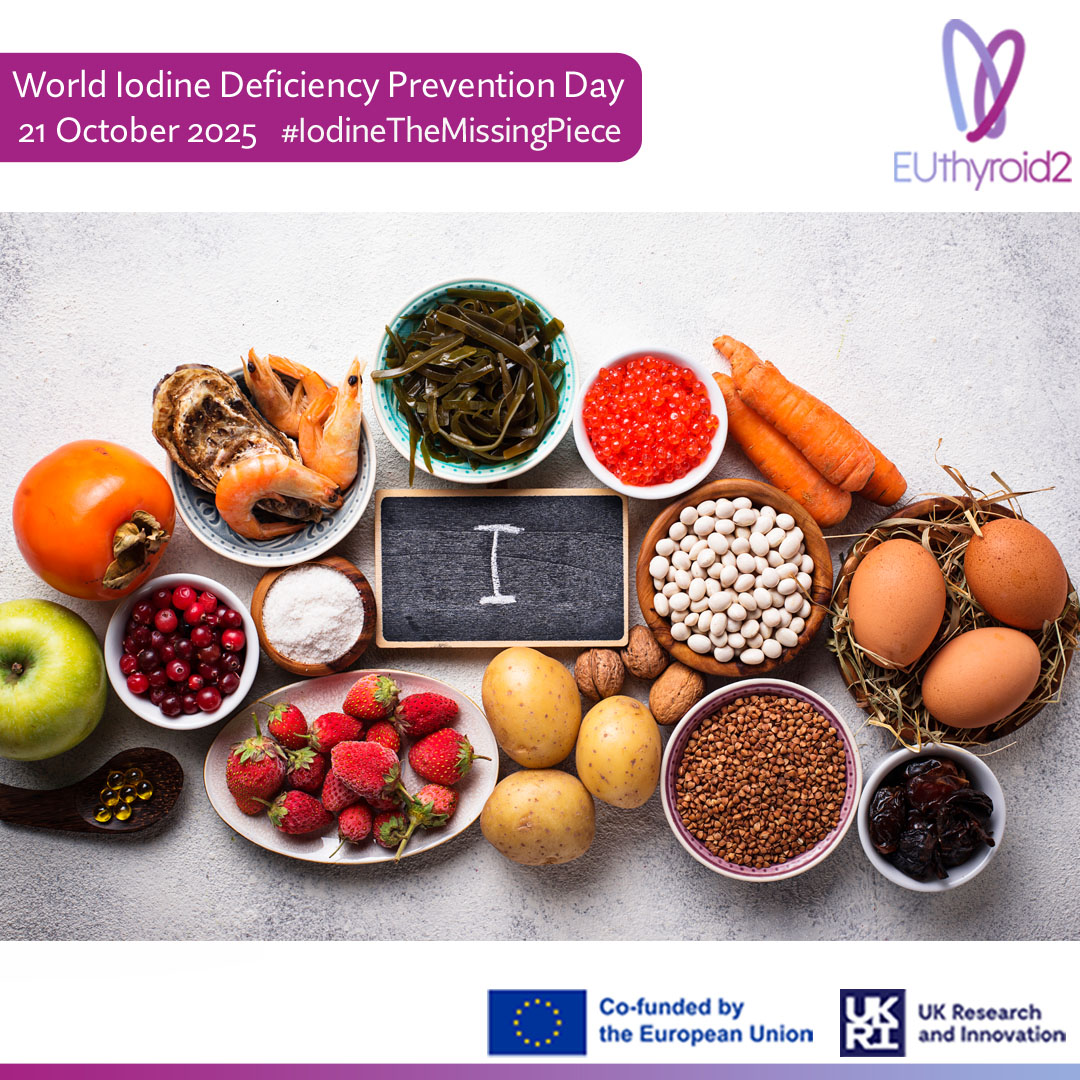
As we are approaching World Iodine Deficiency Prevention Day, October 21, we want to highlight the mission of the EUthyroid2 research project to take steps to tackle iodine deficiency in Europe and beyond with our campaign on social media platforms: ’Iodine, the missing piece’.
Throughout our interventions in the secondary schools and ambulatory care units, we inform adolescents and young women about the importance of iodine nutrition, increase their knowledge, and improve their iodine status.
Within these educational sessions, adolescents and young women are educated about the importance of iodine for health, the consequences of iodine deficiency, recommendations for daily iodine intake, dietary iodine sources, importance of healthy nutrition during pregnancy for the baby’s health, including iodine, and specific iodine intake recommendations during pregnancy.
The worldwide campaign for Universal Salt Iodisation (USI) was a major public health success that significantly improved the situation and is still the major solution recommended by the World Health Assembly. Yet, not all countries adopted USI, and in addition, progress is slipping due to competing priorities and global events.
Apart from the work to raise awareness among young people, EUthyroid2 is committed to increasing awareness about the problem of iodine deficiency among policymakers.
EUthyroid2 is a member of the Iodine Coalition Europe, a partnership dedicated to ensuring adequate iodine nutrition. Together with iodine nutrition experts, representatives of the salt, food, and iodine industries, research, and patient organisations (EUsalt, World Iodine Association, Thyroid Federation International, Iodine Global Network, EUthyroid2, Culinaria Europe e.V., Unilever), we work to create awareness among consumers on the importance of iodine, and among officials to encourage policy changes, and to support the European framework and work to remove barriers to trade in the internal market created by national legislation.
Stronger EU-wide regulations and monitoring mechanisms are essential to protect public health and ensure that future generations do not suffer the consequences of preventable iodine deficiency.
The time to act is now.
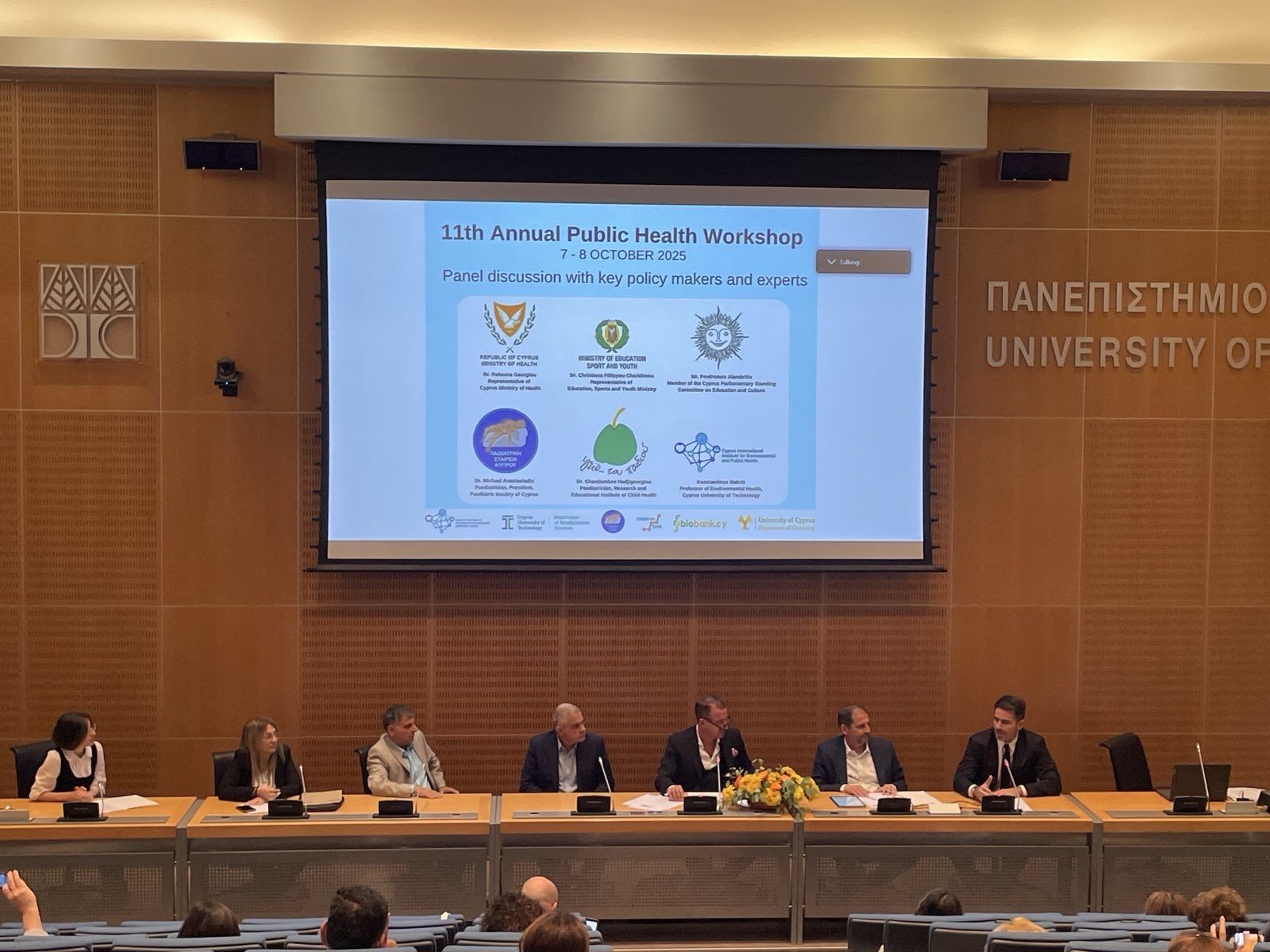
EUthyroid2 partner, Cyprus International Institute for Environmental and Public Health, hosted the 11th Annual Public Health Workshop on October 7-8, 2025, in Limassol, the Republic of Cyprus.
Konstantinos Makris is a Full Professor of Environmental Health at this institute and a partner of the EUthyroid2 project, leading the educational interventions for Cyprus within the research study.
The 11th Annual Public Health Workshop brought stakeholders together to explore how schools can champion health and well-being. The theme of this year’s workshop was: ’Building on Health-Promoting Schools and on Children’s Healthier Future’.
The event included a panel discussion with key policymakers and experts. The session topics were based on the related policy brief produced last year by educators, healthcare providers, parents, policymakers, and already circulated with the relevant Ministries in Cyprus.
The panel was composed of policymakers and scientific experts: Cyprus Ministry of Health, Cyprus Ministry of Education, Sports and Youth, Cyprus Parliamentary Standing Committee on Education and Culture, Pediatric Society of Cyprus, Research and Educational Institute of Child Health, and Cyprus International Institute for Environmental and Public Health.
The session outlined the recommendations and policy actions needed to ensure that Europe upgrades the requirements and infrastructure for a supportive and healthy everyday life and routine for children in schools and beyond.
Schools are an ideal setting to cultivate healthy habits, including a healthy diet. With the right support, schools can become hubs of wellbeing where healthy habits are created, leading to stronger physical and mental health and more connected communities.
The Workshop highlighted that strengthening healthy behaviors in adolescence improves lifelong health and lowers the burden of Non-Communicable Diseases.
The event offered a wonderful opportunity for discussions, sharing research insights, and learning from international experiences that highlighted the critical intersection of education and public health, and strengthened the role of health-promoting schools in shaping a healthier future for children.
The EUthyroid2 interventions in schools in Cyprus are ongoing, with children and adolescents being educated on the importance of iodine nutrition, the main iodine sources, and the risks of iodine deficiency.
Thank you to all colleagues in Cyprus involved in the EUthyroid2 project, and also a big thank you for this impactful Workshop!
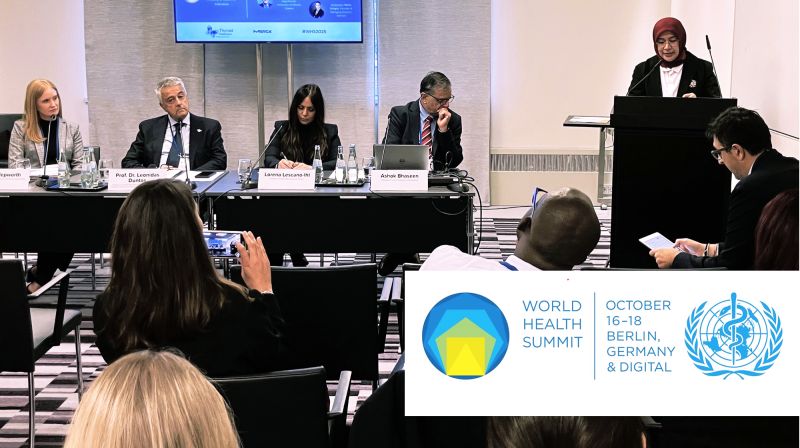
EUthyroid2 partner, Thyroid Federation International, co-hosted an expert panel at the WORLD HEALTH SUMMIT side event. Together with global health leaders and event co-hosts, Ashok Bhaseen, President of Thyroid Federation International, EUthyroid2 partner, and Prof. Leonidas Duntas, EUthyroid2 Member of the Advisory Board, were pleased to provide a platform for an important discussion on what more should be done to advance thyroid health in the NCD era, on October 14, in Berlin, Germany.
A moderated discussion with a panel of distinguished speakers, the event reinforced the call to collective action set out in the recently launched Global Thyroid Action Framework and highlighted best practices in thyroid care.
Within the panel discussion, speakers, along with Ashok Bhaseen, TFI President, touched upon the need:
Prof. Leonidas Duntas, EUthyroid2 Member of Advisory Board, highlighted the importance of nutrition for thyroid health, including iodine, selenium, and iron.
It is crucial that policymakers are included in the dialogue and understand the value of prioritizing awareness, education on nutrition for thyroid health, screening, diagnosis, and treatment of thyroid disorders.
A big thank you to all the panelists:
Susan Hepworth, Global Alliance for Patient Access
Ashok Bhaseen, President, Thyroid Federation International
Prof Leonidas Duntas, Evgenideion Hospital, National and Kapodistrian University of Athens, Greece
Lorena-Lescano-Ihl, Vice President, Global Head Thyroids Franchise, Merck
and we are grateful to Dwi Puspasari - for delivering a keynote address on behalf of the Ministry of Health of the Republic of Indonesia.
After these insightful days, Thyroid Federation International is leaving the WORLD HEALTH SUMMIT inspired, ready to turn insights into action in the thyroid communities.
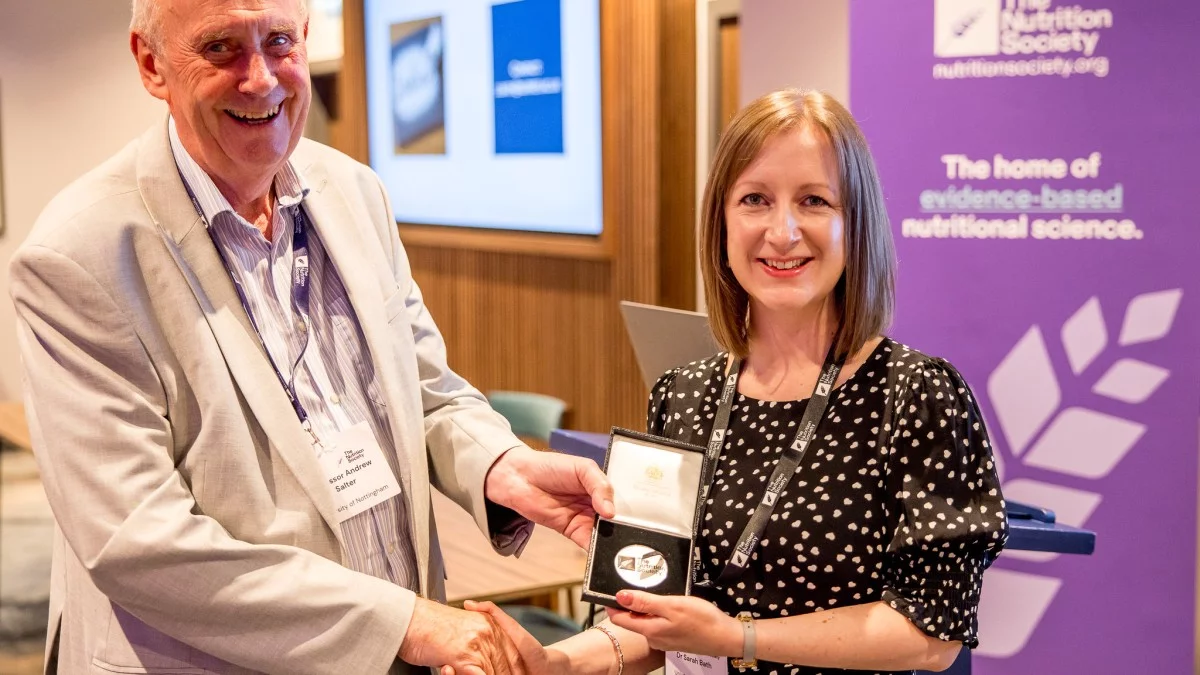
Dr. Sarah Bath, Senior Lecturer in Public Health Nutrition at the University of Surrey, has been awarded the 2025 Silver Medal by The Nutrition Society for scientific excellence in the field of nutrition. Only one Silver Medal is awarded each year to outstanding scientists for their contribution to the field, and it is awarded to scientists for their work within 15 years of higher degree education.
Dr. Bath is a lecturer at undergraduate and postgraduate levels at the University of Surrey, a Registered Dietitian, and a Programme Director for the Nutritional Medicine MSc.
Dr. Bath’s main research interest is iodine, and she has been researching the effects and predictors of iodine deficiency since 2009. Her work showing that mild-to-moderate iodine deficiency in pregnancy was associated with lower child IQ and reading scores was published in The Lancet in 2013. Since then, she has collaborated on projects to explore the effects of deficiency in pregnancy using European population-based birth cohorts. Her work also involves exploring the predictors of iodine status and dietary sources of iodine, including the variability in iodine concentration of cow’s milk and the iodine content of milk-alternative products; her current research focuses on the effects of plant-based diets on the risk of iodine deficiency.
She is currently the chair of the Scientific Advisory Board for the World Iodine Association (WIA).
She delivered the annual Silver Medal lecture at The Nutrition Society Summer Conference in Loughborough entitled ‘Iodine deficiency in the UK – should we take it with a pinch of salt?’. This covered the research on iodine that Sarah has worked on since completing her PhD at Surrey in 2012.
This recognition helps to shine a spotlight on the vital role iodine plays in our health and during pregnancy, which is often overlooked.
At EUthyroid2, we are very proud of Sarah's achievement, and this award is a testament to the recognition of her research in the field of nutritional sciences, nationally and internationally, and to her tremendous work on the role of iodine for health.
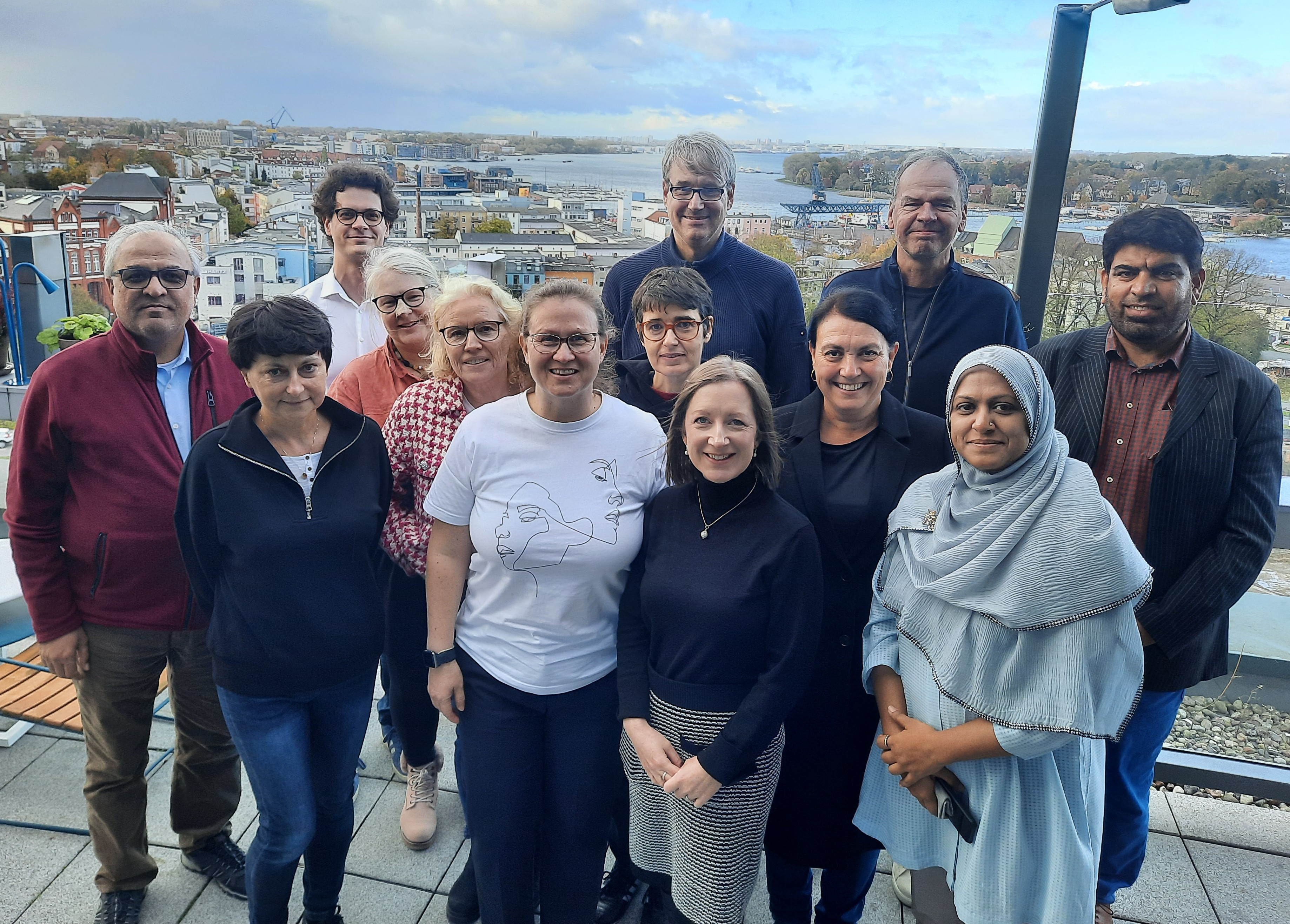
The Third EUthyroid2 Scientific Annual Meeting, held in Rostock, Germany, October 30, offered an excellent opportunity for the work packages to present the progress achieved and discuss challenges, successes, lessons Learned, and next steps.
The day began with an inspiring introduction by Prof. Henry Völzke, Coordinator of the EUthyroid2 project. The meeting progressed with presentations on the study interventions in the ambulatory care and educational settings by:
Sarah Bath, University of Surrey Rehman Mehmood, Islamia College Peshawar Mithila Faruque, Bangladesh University of Health Sciences Vivien Henck, University Medicine Greifswald Konstantinos Makris, Cyprus University of Technology Simona Gaberšček, University Medical Centre Ljubljana Małgorzata Trofimiuk Müldner, Jagiellonian University
Lisbeth Dahl, Institute of Marine Research, and Gitte Ravn-Haren, Technical University of Denmark, discussed publication strategy, measuring iodine status in populations, and food iodine analysis.
Anna Bokor, Thyroid Federation International, gave an overview of leading communications and paving the way for the dissemination of results.
The project partners continue to work to inform and educate children, adolescents, and young people about the importance of iodine for health, and are committed to taking steps towards tackling iodine deficiency and preventable iodine-related disorders in Europe and beyond.
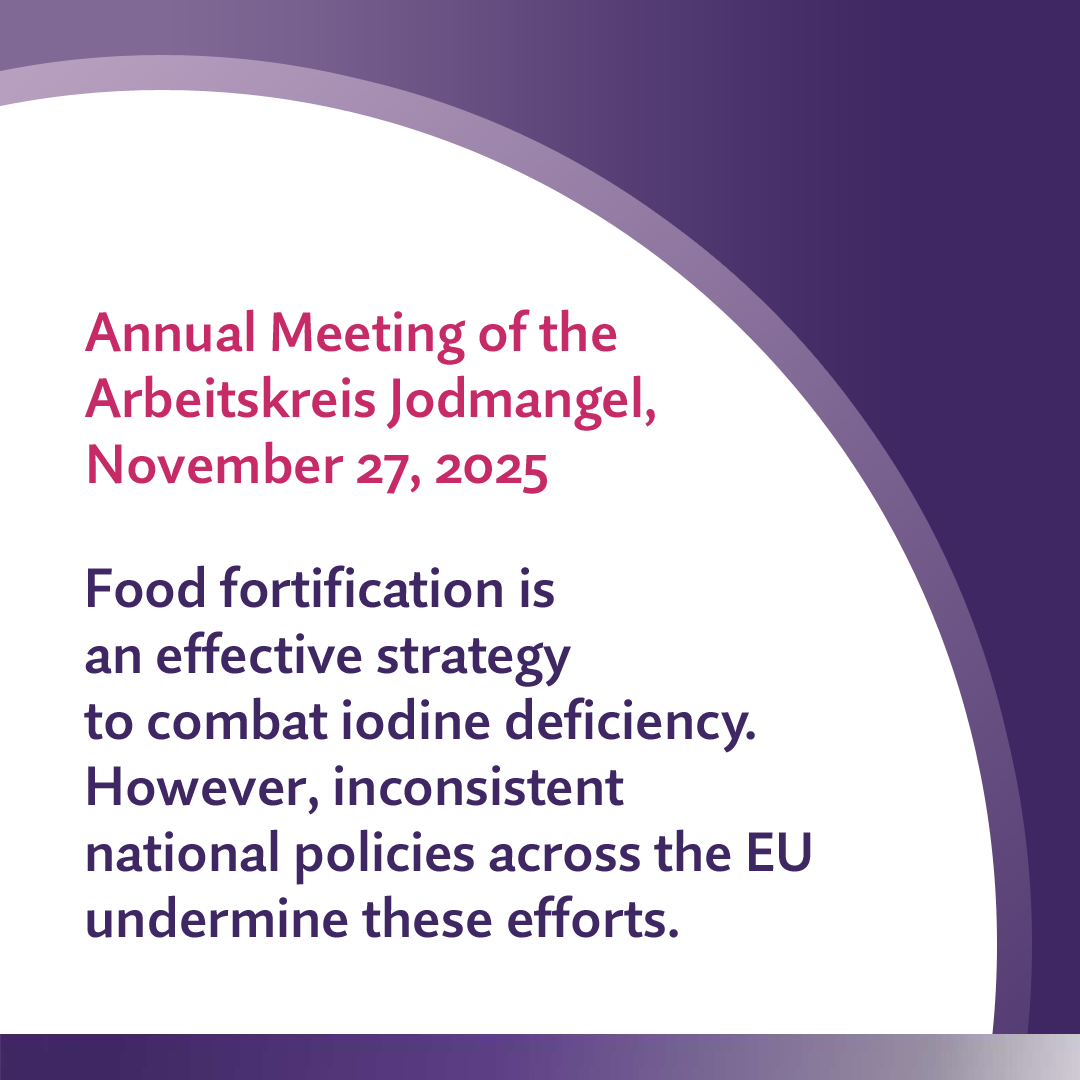
This year, the Annual Meeting of the Arbeitskreis Jodmangel took place in Berlin on November 27, 2025. The EUthyroid2 project was presented by the EUthyroid2 Project Coordinator, Prof. Dr. Henry Völzke, University Medicine Greifswald. On behalf of the Iodine Coalition Europe, Michael Durst, Head of Global Regulatory Affairs - Foods, Co-Chair of the Coalition, participated in the meeting and introduced the work and mission of the coalition.
Michael Durst discussed the legislative and regulatory environment in Europe regarding the wider use of iodized salt in foods, and he pointed out current challenges and policy asks.
To address iodine nutrition and ensure that this micronutrient is accessible for everyone, it is important to have mandatory salt iodisation policies, eliminate the regulatory barriers to the use of iodised salt, and simplify the labelling of iodised salt in prepacked foods.
EUthyroid2 is a partner of the Iodine Coalition Europe, and we work together to involve policymakers and address the issue of iodine deficiency in Europe, and discuss these challenges to create an enabling environment for using iodised salt in foods and for fortifying alternatives to dietary iodine sources.
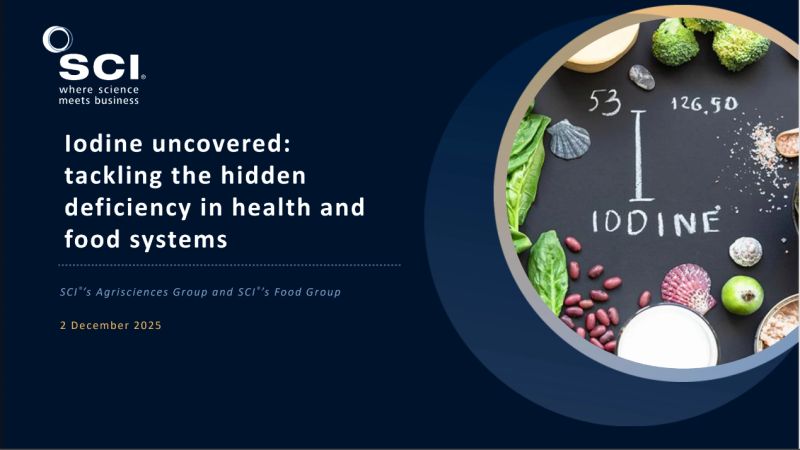
Sarah Bath, Senior Lecturer in Public Health Nutrition at the University of Surrey, EUthyroid2 partner, had a presentation at the SCI meeting on iodine uncovered, in London, on December 2, 2025. This was a collaboration between the SCI's Agrisciences and Food Group, and the programme explored the issue of iodine deficiency from different perspectives. Session 1 covered the health effects of iodine deficiency, global progress in the reduction of iodine deficiency disorders, and data highlighting that iodine status is declining in many European countries. Latest UK data from the National Diet and Nutrition Survey shows a decrease in iodine status in 11-18 year old girls, and in adult men and women; these groups are now classified as iodine-deficient by WHO thresholds.
Session 2 focused on strategies to address iodine deficiency, the role of the dairy sector, and monitoring iodine status in populations, including the challenges and new approaches.
Session 3 discussed issues of food policy and regulations and dietary advice that could reduce the risk of iodine deficiency in individuals, consumer awareness and knowledge, including the EUthyroid2 project presented by Dr Katie Nicol, University of Surrey.
The poster presentations over lunch showcased the range of iodine research that is ongoing in the UK. Colleagues at the University of Surrey were well represented, with posters from Giorgia Perri, Joanne Tettersall, and Jhama Malla (who was awarded one of the poster prizes).
Congratulations to colleagues at the University of Surrey!
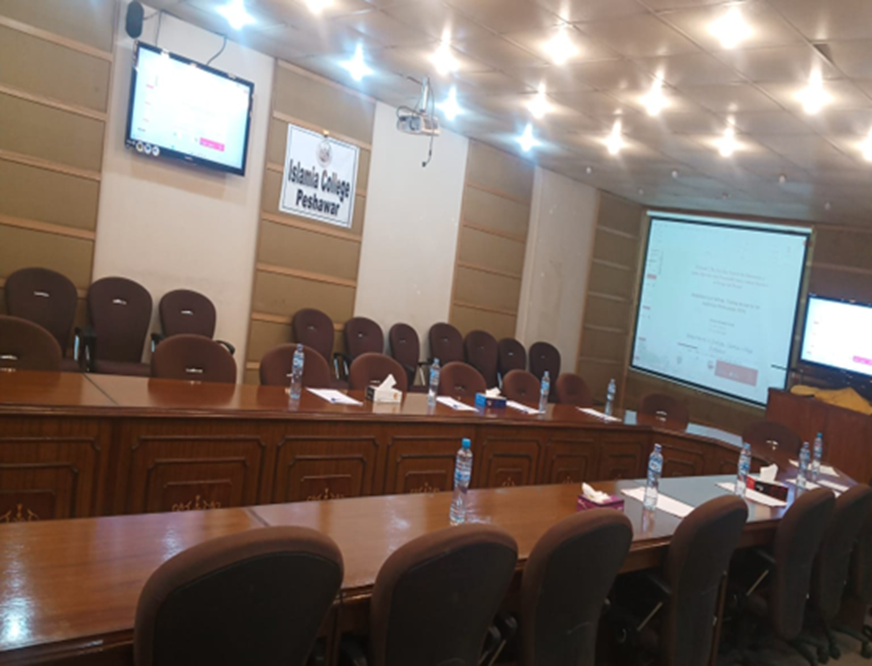
Dr. Rehman M. Khattak, Assistant Professor at the Department of Zoology at Islamia College Peshawar, Pakistan, partner at EUthyroid2, is leading the interventions in both educational and healthcare settings in Pakistan. Adolescents and young people need to be informed to pay attention to iodine nutrition, as iodine deficiency needs to be tackled in the region. In Pakistan, through educational interventions, adolescents and young people are educated about the importance of iodine nutrition for health.
Trained as an Epidemiologist with a specific interest in iodine deficiency disorders, Dr. Rehman M. Khattak works together with his team to deliver outstanding achievements in this project. He and his team organized multiple training sessions and co-arranged trainings to inform and instruct about the project, and established a lab. In November 2025, he held a lecture at the Islamia College Peshawar on the EUthyroid2 project description and was very well received.
We want to thank you to Dr. Rehman M. Khattak and his entire team, who go above and beyond to deliver exceptional achievements in the EUthyroid2 project: Aisha Imtiaz, Research Associate, PhD student, Muhammad Altaf Khan, Research Assistant, MPhil student, Miss Laiba Khan, Data Entry Assistant, undergraduate student, Miss Zonaisha Khan Bangash, Data Entry Assistant, undergraduate student, Miss Hira Sardar, Data Entry Assistant, undergraduate student, Miss Rukhsar Khan, Data Entry Assistant, undergraduate student.
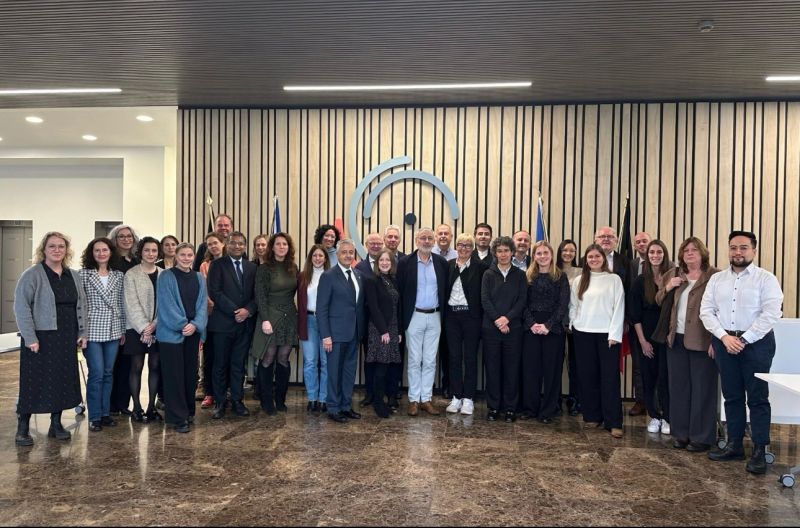
Across Europe, mild iodine deficiency is re-emerging, particularly among young and pregnant women. The WHO Regional Office for Europe and the Iodine Global Network have brought together public health authorities, researchers, industry representatives, civil society organizations, and patient groups to explore practical, coordinated solutions for improving iodine nutrition.
This high-level meeting, ’Preventing rising iodine deficiency in Europe', explored: legislative and regulatory hurdles, country experiences and best practices, awareness raising and communication strategies, and the impact of inaction on health and cognitive outcomes.
The morning session included:
Welcome remarks by Madam Mieke Walraevens, Director General of DG Animals, Plant and Food, FPS Public Health, Belgium
Brief introductions by Dr. Kremlin Wickramasinghe, WHO, and Dr. Werner Schultink, Iodine Global Network
Presentations by report authors Dr. Maria Andersson, Dr. Rodrigo Moreno-Reyes, Dr. Sarah Bath, and Gregory Gerasimov
Country updates: Chair of session: Dr. Kremlin Wickramasinghe and an introduction by Dr. Laurence Doughan, Senior Expert in Nutrition and Food Policy, Belgium
Country approaches to address the problem of iodine deficiency in Europe with case studies from Norway, Switzerland, Germany, and Portugal: Chair of session: Dr. Laurence Doughan
The afternoon session consisted of two roundtable discussions:
Roundtable 1: explored how regulatory frameworks shape iodised salt use in food production, drawing on insights from: Chair and first presenter: Michael Durst, Unilever, Iodine Coalition Europe, World Iodine Association, Carrefour Belgium, and Dr. Arnold Timmer, Iodine Global Network
Roundtable 2: focused on raising awareness through the EUthyroid2 project, safeguarding Europe’s children, and the patient perspective:
Chair and first presenter: Dr. Henry Völzke, EUthyroid2 Project Coordinator, Dr. Konstantinos Makris, Cyprus University of Technology, Markus Lanz, Kiwanis Children’s Fund, Linda Henderson, Thyroid Federation International, Anna Bokor, Thyroid Federation International
The discussions concluded that coordinated action, grounded in strong policy and backed by research, is essential to strengthen iodine nutrition across the region.
Thank you to the organizers for this successful event!
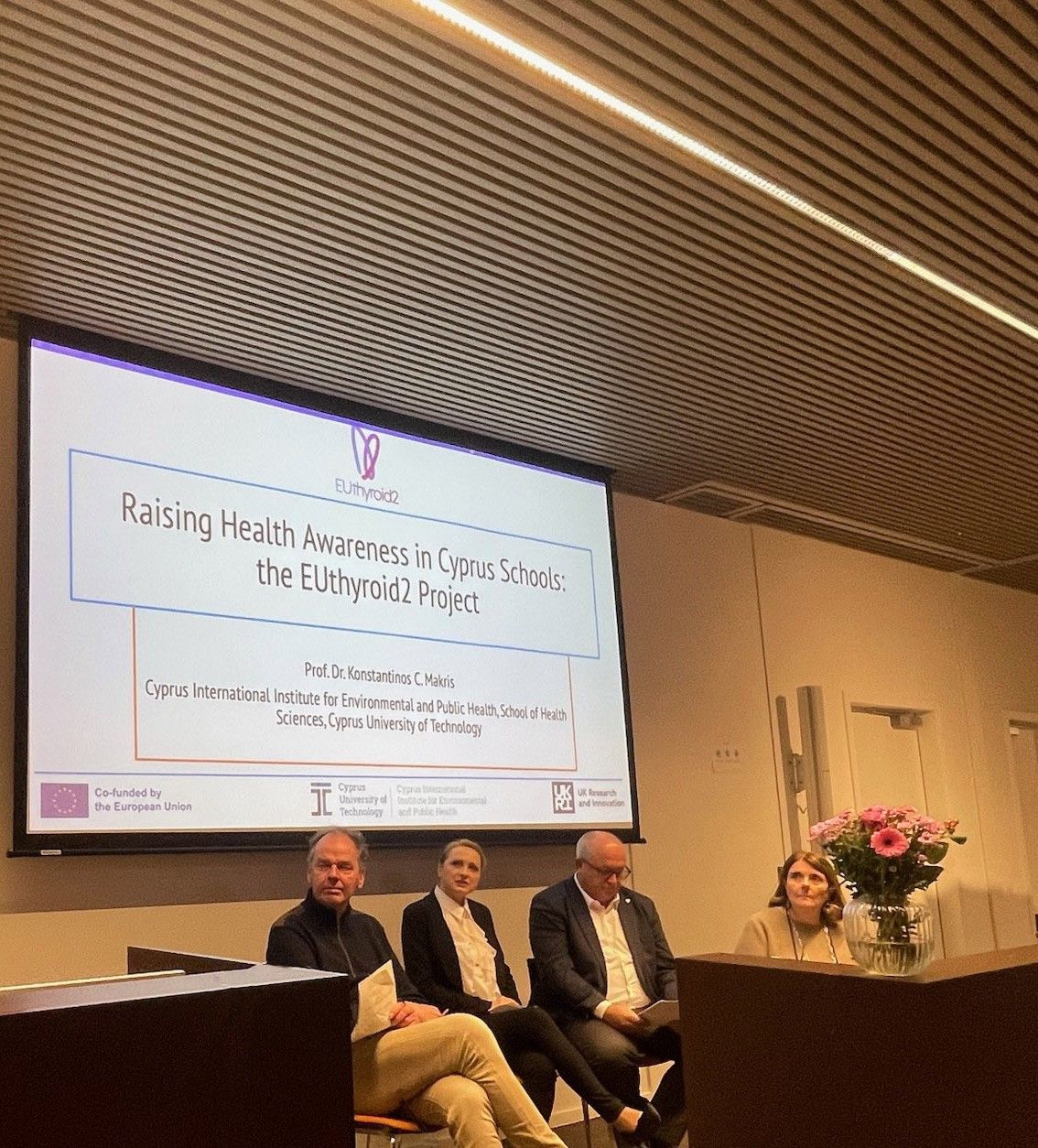
Prof. Dr. Henry Völzke, Coordinator of EUthyroid2, presented EUthyroid2 in Brussels on December 3, 2025, at a high-level meeting on preventing rising iodine deficiency in Europe, sponsored and hosted by the government of Belgium, organized by Iodine Global Network and the WHO Regional Office for Europe.
Across Europe, mild iodine deficiency is re-emerging, particularly among young and pregnant women.
Roundtable 2 of the meeting focused on increasing awareness among children, adolescents, and young people and was chaired by Prof. Dr. Henry Völzke, University Medicine Greifswald, Coordinator of the EUthyroid2 Consortium.
Prof. Dr. Henry Völzke presented the ongoing interventions of the project in the ambulatory and educational settings, both in the European and Asian regions, and highlighted that there is a clear need for solutions to improve iodine intake. Potential approaches include adopting a food systems perspective, targeted food fortification, and improving awareness and knowledge of iodine.
Ensuring sufficient iodine intake is essential for healthy pregnancies, child development, learning outcomes, and long-term population health.
The critical point to reach long-term sustainability is to convince policymakers to take action, and create an enabling environment for using iodised salt in foods and for fortifying alternatives to dietary iodine sources, and ensure that this important micronutrient is accessible for every citizen.
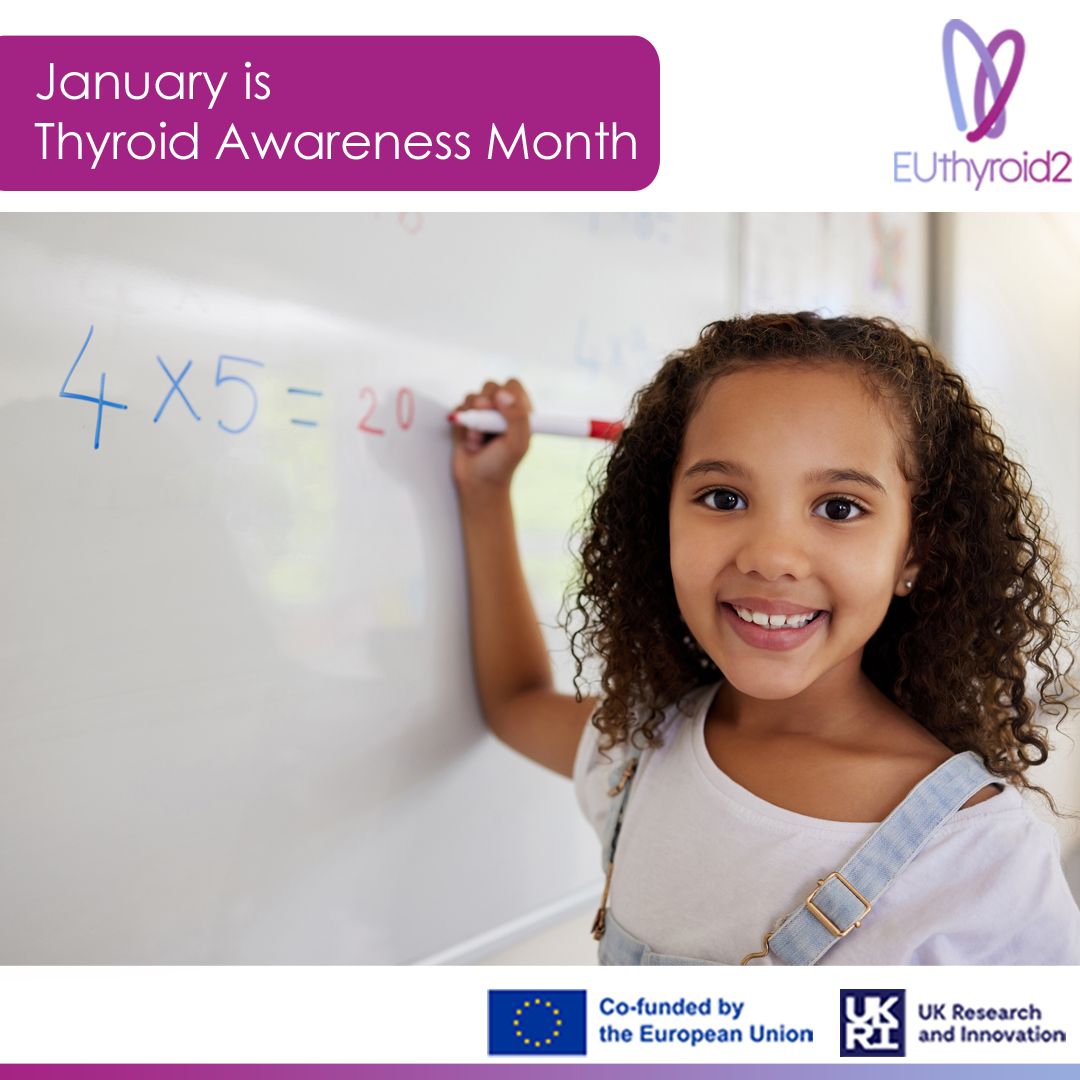
January is Thyroid Awareness Month, and we aim to draw attention to the importance of iodine nutrition for thyroid health, particularly for young women. Iodised salt is a simple method to ensure adequate iodine intake. Yet, inconsistent national policies and a lack of harmonization slow progress.
What are the most pressing regulatory challenges?
lack of harmonised policies on iodised salt across the EU: countries have different regulations, creating legal uncertainty for businesses and limiting access to consumers
current food labelling laws can be confusing, requiring complex chemical descriptions instead of a clear term such as ’iodised salt’.
Apart from increasing knowledge and awareness among adolescents and young women through study interventions, EUthyroid2 is a partner of the Iodine Coalition Europe, and together, we aim to protect Europe's population from a re-emerging iodine deficiency.
The Coalition brings together iodine nutrition experts, representatives of the salt, food, and iodine industries, research, and patient organisations.
Together, we aim to promote salt iodisation, including the use of iodised salt in processed foods and iodine fortification of specific food groups (e.g., plant-based dairy products) – and address the obstacles hindering their full implementation.
We work to reach out to policymakers and other stakeholders to enhance policy changes so that all Europeans have access to iodine.
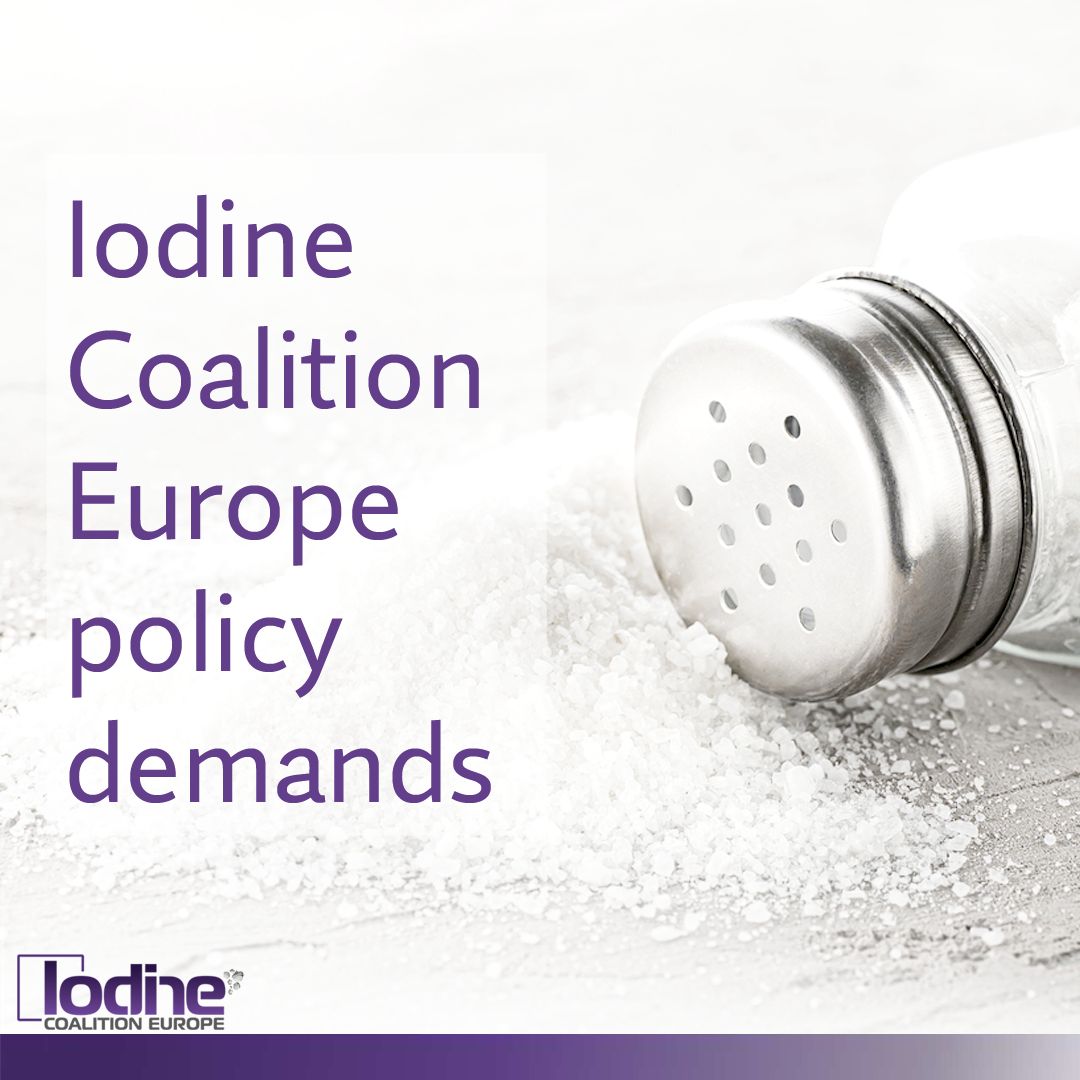
EUthyroid2 is a partner of the Iodine Coalition Europe, a multi-stakeholder partnership that works to reach out to policymakers and other stakeholders to ensure that Europeans have adequate iodine nutrition.
Iodine is crucial for the production of thyroid hormones. Thyroid hormones are essential for a baby's proper growth and neurological development, as the fetus relies on maternal hormones. The body cannot produce iodine, so it requires dietary intake to prevent iodine deficiency.
Iodine Coalition Europe policy demands:
1️⃣simplified labelling rules so that consumers understand what they are buying:
THE EUROPEAN COMMISSION to adopt a delegated act in accordance with Article 19(2) of Regulation No 1169/2011 on Food Information to Consumers, to exempt iodised salt from mandatory ingredient breakdown when added to prepacked foods.
2️⃣consistent interpretation:
THE EUROPEAN COMMISSION to guide Member States to ensure consistent interpretation of Regulation (EC) No 1925/2006 on the Addition of Nutrients to Foods, to clarify that iodised salt can be added to compound foods without that food becoming a ‘source of iodine’.
3️⃣removing trade barriers:
EU MEMBER STATES to provide legal certainty by clarifying that products containing iodised salt compliant with the regulations in another Member State can be marketed freely, despite iodine levels differing from the local standards (mutual recognition).